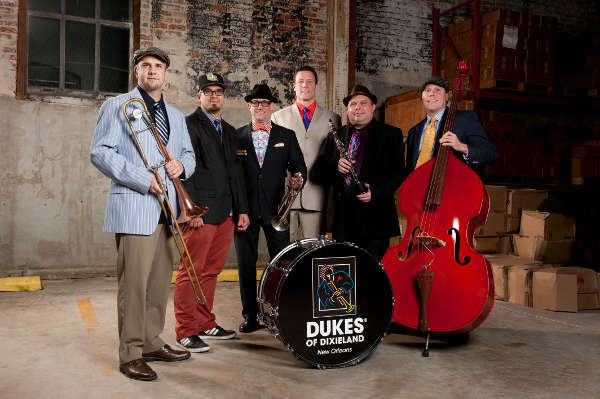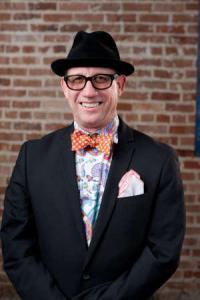A Note of Correction: Deano Assunto, the son of trumpeter Frank Assunto (of the original Dukes of Dixieland) was in touch with us recently to note some inaccuracies in the following article
Mr. Assunto writes that “due to a court settlement against John Shoup there is to be ‘no implying any historical connection’ between Shoup’s copy band and the original pre-1974 Dukes of Dixieland which your article clearly does.”
Regarding Shoup’s use of the name The Dukes of Dixieland: “Your article also stated that John Shoup says that Freddie’s widow Betty Assunto gave him the rights to the Dukes of Dixieland name which is not true. In our first lawsuit against Shoup he could provide no documents to prove [that claim].”
Mr. Assunto also says that John Shoup neglected to mention “that there is still ongoing litigation against him in the courts at this time.”
For more on the Original Dukes of Dixieland, please visit the Dukes’ website: www.thedukesofdixieland.com.
The DUKES of Dixieland: Adjusting to the Times
The story of the Dukes of Dixieland is really the story of two bands: the original Dukes of the Assunto Brothers (1947-74), and the present-day DUKES who have navigated the past 42 years under the watchful eye of promoter John Shoup and are currently led by trumpeter Kevin Clark.
The “real” Dukes (as the website maintained by the Assunto heirs contends) were part of the resurgence of Dixieland following World War II. Frank and Fred Assunto formed a high school jazz band in their home town of New Orleans in 1947. They called it the Basin Street 4, and when players were added, it became the Basin Street 5, 6 and so on.
The band played mainly on weekends until Horace Heidt and his Musical Knights came to town with their Pot O’ Gold radio show seeking young, fresh talent. The Basin Street 7 (with father Papa Jac on trombone and banjo and Pete Fountain on clarinet) were a tremendous hit, and Heidt invited them to go on the road with his band. When the tour ended, the boys returned to New Orleans, outfitted themselves in uniforms, and changed the name to The Dukes of Dixieland at the suggestion of their mother by way of continuing the tradition of jazz royalty in the Crescent City.
First to Record in High Fidelity
The band was the first jazz group to record in stereo when their Audio Fidelity (and later Columbia and Decca) records became hot sellers in the 1950s and early ’60s. Their popularity grew with long-standing engagements at The Famous Door in New Orleans (44 months), The Thunderbird in Las Vegas (64 weeks) and the Preview Lounge in Chicago (16 weeks, the longest for a Dixieland band there) along with concert dates and appearances across the country.
Fred Assunto (trombone) passed away from cancer and a heart attack in 1966 and over the next few years, Frank (trumpet) struggled to keep the band going as more modern styles of jazz grew in popularity. In late 1973, the Dukes were in St. Charles, Illinois, and John Shoup (a Chicago restauranteur who had done extensive TV production that included a Mardi Gras special for CBS and the culinary Great Chefs series) picks up the story.
“I see Frank, but I don’t recognize anybody else in the band. He tells me he just flies into a city and picks up local musicians. It was sad because I knew he wanted to keep the band going. The next weekend, I hear he’s checked himself into a hospital, and he died of a coronary the following February at the age of 42, one day before Mardi Gras.”
Keeping the Tradition
Following a benefit show for the two widows, Pete Fountain suggested that Shoup talk to Betty Assunto, Fred’s widow and occasional singer with the band (she was known as “The Dutchess of Dixieland”) about putting a new Dukes of Dixieland together. Betty agreed to turn over the name, which Shoup immediately registered, and booked the band into the Hotel Monteleone on Royal Street in the French Quarter, taking over a 17th floor lounge from Louis Prima and renaming it Duke’s Place where they remained for 10 years.
The next home base was Lulu White’s Mahogany Hall at 309 Bourbon Street (named for a legendary Storyville bordello). In 1991, the DUKES (the capitalization added in recent years for differentiation purposes) moved to the Steamship Natchez where they still perform for nightly dinner cruises on the Mississippi. Leaders since 1974 have included Connie Jones, Mike Vax, Otis Bazoon, Frank Tipani, Dickie Taylor, and currently for a second time, Kevin Clark.
When Hurricane Katrina hit the Gulf Coast in the summer of 2005, the Natchez was sent up the river out of harm’s way, and the homes of many of the band members were destroyed. That Fall, the Bush-Clinton Katrina Fund asked the DUKES to travel on the Natchez up the Mississippi and Ohio Rivers to raise money for victims of the hurricane.
Breaking New Ground
There is currently no formal connection between Shoup and the Assunto family, and there was an extended legal battle over royalties, which has since been settled. The DUKES have kept up with the times as musical tastes evolve, and Clark admits the current group puts the emphasis on putting on a show that is up-to-date and entertaining, saying, “our focus is to play music in the New Orleans style, and that can involve anything from Jelly Roll Morton to Louis Prima to James Booker to Professor Longhair to the Neville Brothers.”

“With 400 tunes in our book, much depends on the crowd in attendance,” he continues. “While the traditional jazz audience is getting smaller, we still want to keep the proverbial torch burning. We’re not a brass band like Preservation Hall. We have themed shows on “Legends of New Orleans,” the Mardi Gras, “Symphonic Jazz,” “Blues from the Bayou,” and even “Country Meets Dixie.”
“We love the Hot Five, or we might do 20 minutes of Ellington or Fats Waller. If it’s a college crowd that wants to dance and socialize, we keep it light. We may throw in some Dr. John or Ernest Tubbs, perhaps a little Jerry Lee Lewis. Versatility is the key. New Orleans music is like a wave. It just keeps coming at you. Be prepared.”
While the early Assunto Dukes stuck to the familiar Dixie tunes, their later recordings popularized such pop tunes as Sunrise Sunset, Michelle, and Shadow of Your Smile. The 21st Century DUKES, who tour roughly 30 days a year, maintain that same, but ever-changing balancing act that keeps the music fresh, and the musicians excited to play night-after-night. They have recorded a CD with a gospel choir and performed with symphony orchestras, in Carnegie Hall, and with the Boston Pops. They still end their sets with an updated arrangement of The Saints.
When you come to hear the oldest continuously performing Dixieland band in person, don’t expect a history lesson. Just sit back and enjoy the music. You’ll get a real jazz education.
 Sidebar: Kevin Clark, current DUKES leader
Sidebar: Kevin Clark, current DUKES leader
Kevin Clark acknowledges that he is the only member of the DUKES of Dixieland band who did not go to college. (Two current members have Master’s degrees in music.) Growing up in Florida, he opted to go on the road with the Ringling Bros-Barnum & Bailey Circus Band and later to become a staff musician at Disney World. He moved to New Orleans in the late ‘90s and was the lead trumpet for the DUKES over the next decade.
He then headed for Canada where he was the music director for Toronto’s Historic Distillery District, performing nightly with a quartet and booking live entertainment for three venues. After a brief stop in Charlotte, North Carolina, he returned to the Big Easy and the DUKES in 2010 and has been doing the arranging for all the DUKES recordings.
Kevin is also a member of the New Orleans Nightcrawlers and has toured with Pete Fountain and Clarence “Gatemouth” Brown. Pete Fountain calls him “a great player with a warm New Orleans style.”
Lew Shaw started writing about music as the publicist for the famous Berkshire Music Barn in the 1960s. He joined the West Coast Rag in 1989 and has been a guiding light to this paper through the two name changes since then as we grew to become The Syncopated Times. 47 of his profiles of today's top musicians are collected in Jazz Beat: Notes on Classic Jazz.Volume two, Jazz Beat Encore: More Notes on Classic Jazz contains 43 more! Lew taps his extensive network of connections and friends throughout the traditional jazz world to bring us his Jazz Jottings column every month.






















